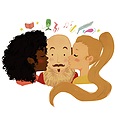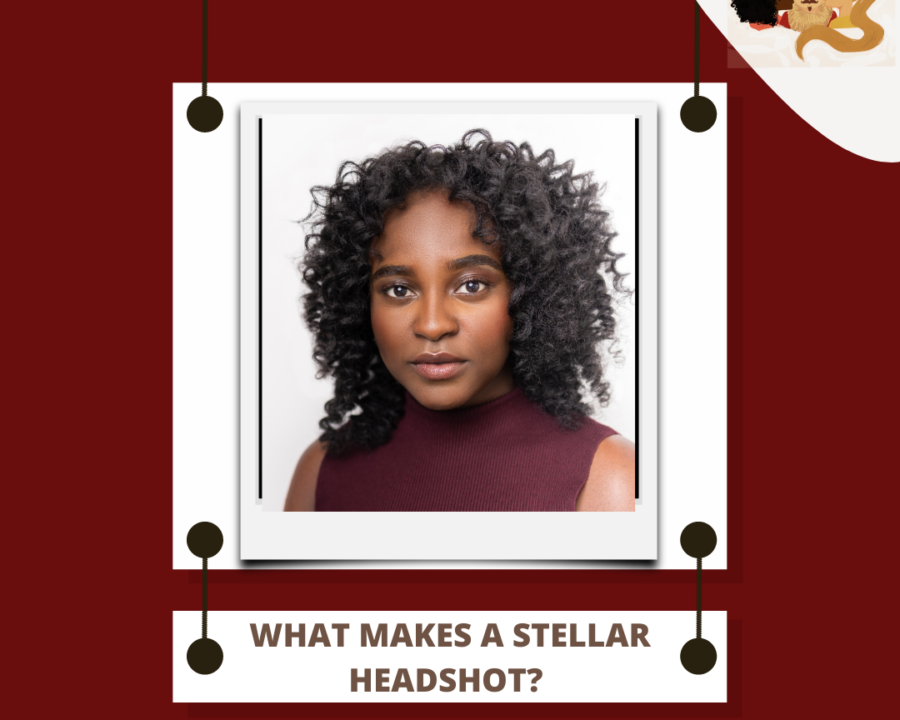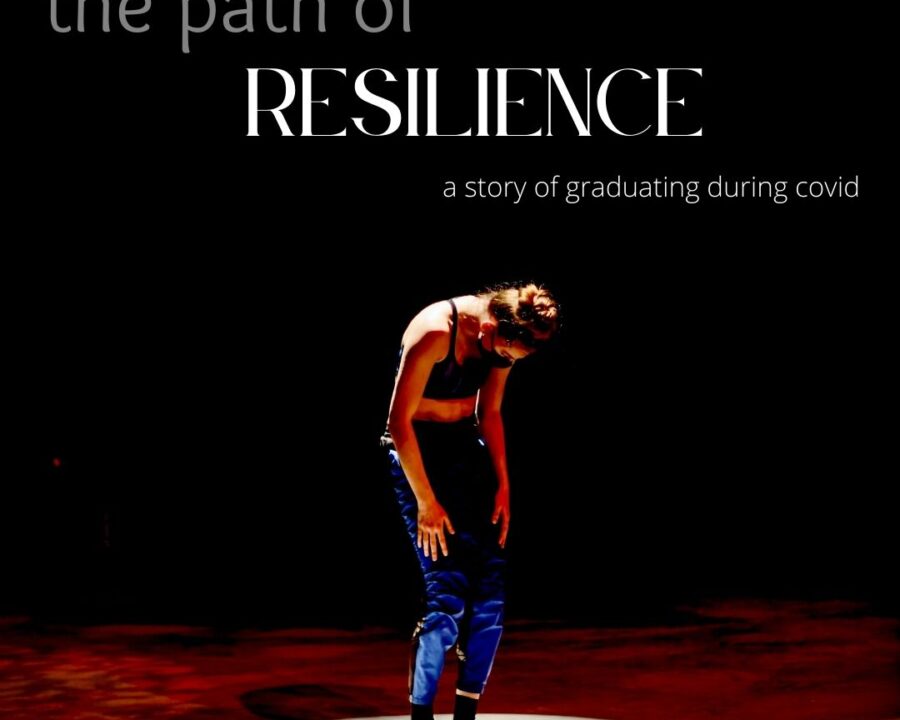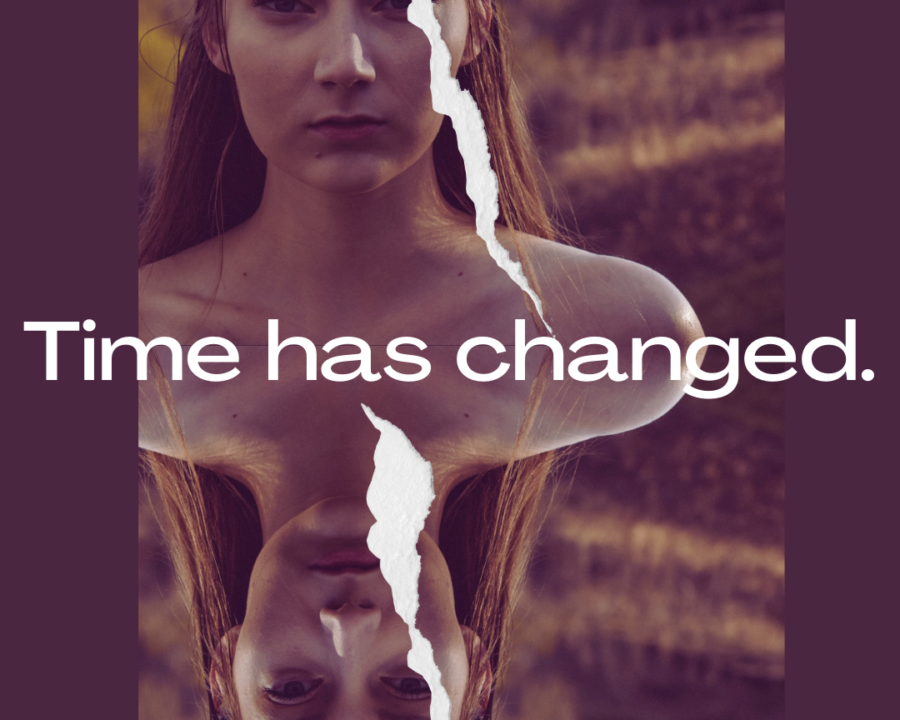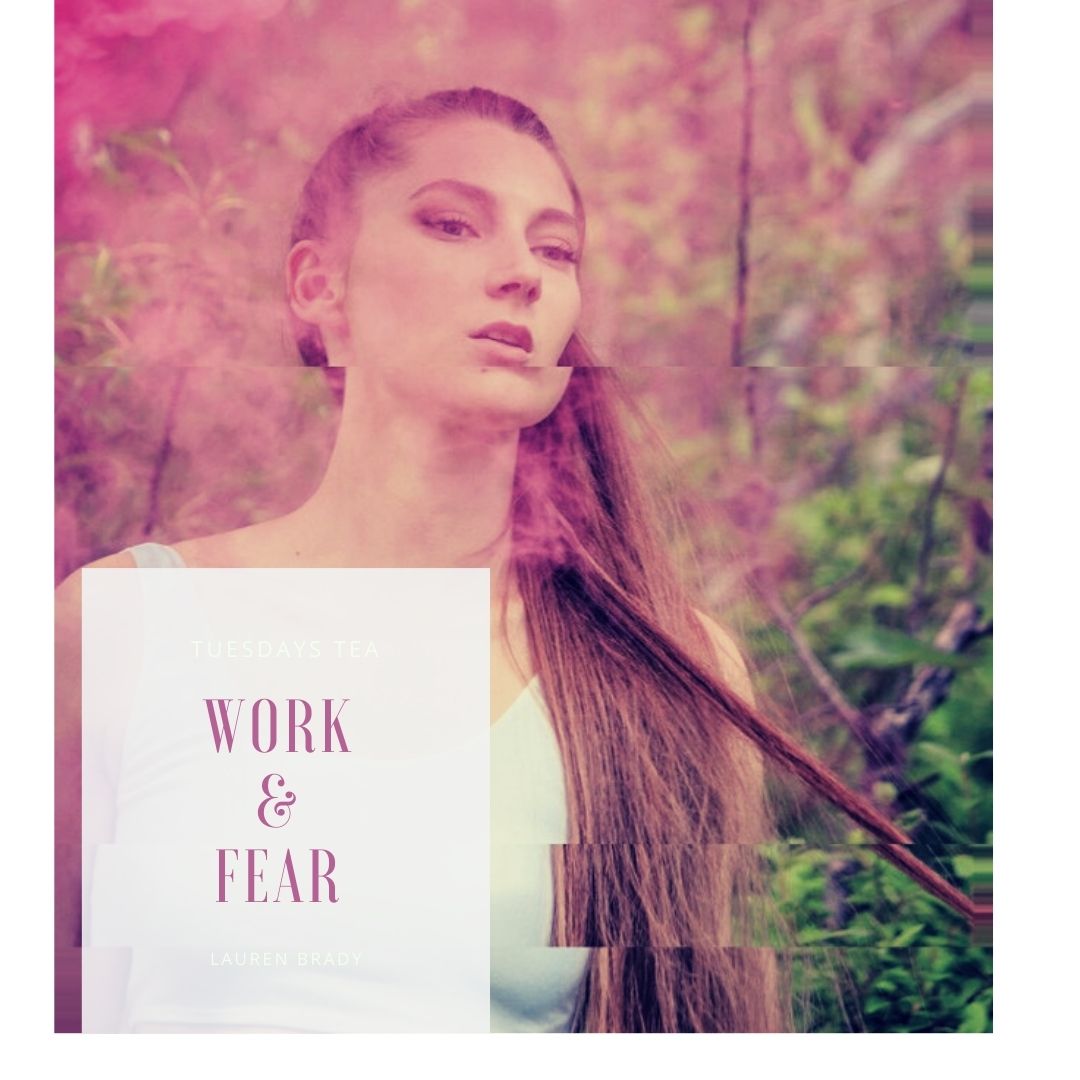
TUESDAYS TEA
October 13, 2020
TUESDAYS TEA
November 10, 2020Today’s Tuesday’s Tea blog is not the usual artists feature because this time we are speaking with someone who is a lot more experienced in the industry. Here’s our special segment Insider Scoop into the real world of theatre.
Tyler Check is a Toronto based actor, musician, writer, teacher, podcaster, and the Artistic Director of Suitcase Theatre. Originally from Kingston, Ontario, Tyler has spent the past several years performing in theatres across Canada in shows such as Mamma Mia, Forever Plaid, and The Million Dollar Quartet. When not travelling for shows Tyler lives in Toronto and can be found writing, composing, teaching classes, and sitting down to chat with other Canadian theatre artists for his podcast Let’s Grab Coffee.
INSIDER SCOOP
Tyler Check

As a writer, Tyler has collaborated on several shows which have been workshopped and produced all over Canada. As a teacher Tyler most recently worked as the Head of Music at George Brown College in their acting program where he worked with the 1st, 2nd, and 3rd-year students on vocal technique and was commissioned to write the music & lyrics for their original TYA musical based on the stories of Robert Munsch. Finally, as Artistic Director of Suitcase Theatre, Tyler has developed several original TYA musicals that have toured to schools throughout the GTA and across Canada. His most recent show for Suitcase Theatre, Stronger Together: Opening Doors to Mental Health premiered this past fall in schools and was streamed as a part of the National Arts Centre’s #CanadaPerforms series in May.
Emerging artist Journey
Sheridan graduate to creator of Lets Grab Coffee Podcast
For me as an emerging… then again, I think it’s all about perspective. I’ve kind of stumbled backwards into doing the podcast a little bit. It kind of honestly an idea that came from… I was sitting around a table, at school, still in my fourth year at Sheridan. I talked to my roommates about how our teacher (One of our directors at the time) told this story that was funny, interesting, and informative. I learned things about the industry from it, I learned something about that artist from it, and I thought, “I would listen to this in a podcast form,” and no one was doing it. Literally, a week later, I was interviewing people, I Amazoned a Blue Yeti mic, and was just off to the races. I definitely had that drive, and I feel already from our very brief time talking together is that you have that same level of, “let’s go, let’s make this happen, we are going to do this,” – Which is specific energy to that time which I think is so important. My version of that went into, “I’ll figure it out along the way; let’s go.” I am very thankful for that in the same way.
Of course, looking back, I never would have been able to see what the podcast or what these things would have done for me to be able to build my network and build like my huge support of people. Networking can sound like such a gross term sometimes, but when you really just think of it as – sitting down having real conversations, making connections so that if you are doing some exciting projects, and meet someone who is doing something similar. It’s your responsibility. I think as an artist in this community, to connect those people. This is all just hindsight on that stuff. At the time, I would say my thing (and this is a long-winded answer), I still feel like I’m emerging. And I think everyone who really is working at their craft should always almost always feel like an emerging artist no matter what level they are at. I know that sounds silly, but like guess what? Just from my experience and the way I like to think about it, there’s no arriving. You don’t arrive. It’s not like “Welcome to the gate, and guess what? Now everything is wonderful” – Unfortunately, that doesn’t happen. They sell that lie in school. The people that I’ve worked with and the people I’ve been most inspired by in the industry are the people who would constantly want to learn and grow as artists themselves. They have that constant curiosity. Again, I think it is something (the drive) that comes forward. That drive that comes from being an emerging artist that can hinder you a bit, is worrying too much that everyone is concerned with what you are doing—or scrutinizing everything you are doing. Everyone is so stressed about their own crap, and no one got time (not in a rude way) to think about you in a rehearsal hall. If you’re like, “oh, I messed up this little thing,” you’re better off just honing in and focusing not on that (mistake), because everyone is focusing on what they just did and what they just did wrong.
Are we always emerging?
The arrival of the artist
I feel that the emerging part should never go away. I think it could really benefit you as an artist to have that longevity and that constant joy of discovery as an artist. You kind of go in phases of that (discovery), and I think as you leave school and at the end of school (you can really feel it). You try to section parts of your life a little bit, you know what I mean?
Transitions are an interesting thing for anyone when you go into a new phase of something. I think those phases try and give us a sense of control. I try to think myself into a place where I thought, “oh ya, school that is done, and now I’m like an industry person.” I think that mindset can be a bit of a tricky thing, and that’s probably where I ran into issues along the way as an emerging artist. I was trying to feel “when will I arrive” as an artist.
Eunice – That’s very true. I like the idea that you said, “I’m not arriving at a place, but I’m always emerging into a space.” Always kind of thinking of every kind of space that you enter into is a new opportunity – it’s a new space to discover new things. It gives you the freedom to just explore, and fail, and fail better and keep going. Cause I find that too, in certain areas someone may go to be and be like “you and this expertise,” and I’ll be like, “oh, I don’t think I have expertise in this, I think I’m always learning about this.” There’s a journalist called Graham Greene who believes that a story has no beginning or end and furthermore that we as people can choose our beginnings anywhere; we can always have a new beginning.
Tyler – yes, I love that, and every day should be a beginning like that.
This is a huge thing in our time right now. Often times, school is a bubble, and the industry is a bubble. We can sometimes get into the thought of not remembering that it’s an industry. And thinking about it in terms – for me, it’s like rewiring your own narrative, and you are in control of that.
Where are your beginnings? Where are your new starts? Where are your new shifts and perspectives? – and writing that for yourselves. Consciously writing it, like what you are doing with this blog, I think it is so beneficial sharing that. There needs to be more of people who are learning something. I would much rather have the teacher who loves the work and is continually learning than the expert in the work. Do you know what I mean?
Eunice – Yes, the student is learning from the prof, but the professor is learning from the student. I think in our generation, especially in a conservatory program many professors can be defensive when you express a new opinion instead of being open to talking about it.
Tyler – I’ve been thinking about this lately. A lot of post-secondary institutions have been coming under a lot of scrutinies. Thinking back to my own experiences, It always comes down to what seems like a lack of communication and insecurity in what happens. It’s a tricky industry, those teachers a lot of the time we give them this thing of “they’ve arrived, they’ve emerged, they’re some artist.” They might be sitting there being like, “what the hell am I doing teaching this class? I don’t know what I’m talking about.”. I remember the first time I saw a professor at an audition I was at, and I was like, “Ooooo, this never changes,” this is your life as an artist. Remembering that people are on every side of this angle, everyone is just trying to figure out a very sticky industry.
The gap in the industry .
Connecting emerging and professional
Two schools of thought that I got from these performers Master Classes. One is Helen Mirren’s perspective that you accept roles that connect to your vision or process as an artist. Then, Samuel L. Jackson believes that an artist should accept any opportunity to get themselves in the room and make networks and connections.

What is your position on this are you Mirren’s or Jackson’s?
Tyler – Where am I in my career, what am I doing? Am I an emerging artist, or am I where I am right now because that is two completely different answers?
Lauren – Both
Tyler – As an emerging artist, one of the big perspectives that I tried to hold on to was to be be courageous like people like yourselves in school, challenging and questioning industries and constructs. I have always been a big believer in seeing where you are in the situation and getting yourself to a place where you can make a change you want to see in the world and then when you get there to make that change. I know it is different, but when I was just getting into the theatre industry, it was all about hustling and going as hard as I could all hours. I was staying in a hobbit hole of an apartment in downtown Toronto just because I needed to be in the city and really grinding to get into the rooms and get into the spaces where I knew if I was given a chance could make something happen. And once I was in the room, make sure that it does not become I am not emerging artists screw those people. Now I am here with the professionals hanging out.
That is why I love what your blog is doing as you have talked about bridging that gap, bridging that disconnect that there seems to be through nobody’s fault of their own through the artists who would consider more arrived or established might be busy and stressed on their own things. Focusing on moving forward in their career to the insecurities that come from being an emerging artist by not asking the questions just there is a divide there and calling it what it is. Opening up is what we have talked about is really the only way to deal with it. Right now, I have also, at this time, cause of covid. The way the industry is at has gotten into some new interests and done some other things that now I would feel because my perspectives are diversified. What I like has diversified; I would probably be more aligned with Helen. Still, I understand the Samuel L Jackson thing for sure as an emerging artist 100 percent because it is also defining what you want to do as artists. She (Helen Mirren) would have that perspective to having been attached to like work that leans primarily on the process as for me, I am not all about my process as I am with the connection with the audience. Relationship with the audience is what intrigues me as an artist, where I have been really interested in trying to champion work getting outside the theatre community and getting back to a place where theatre, the arts and live entertainment is not a random thing someone works a 9-5 job does every now and then it is what you do, you are a part of a rich society that champions artists so go ahead and talk about it and realize that as a community. I think we need to go back to the audience being a part of the conversation. I think we are doing that now cause it is going to be on a smaller scale. Indie artists doing cool things with their friends outside of the industry come and start talking about it, and that bleeds in and bleeds into the rest of the world. With that being said, when an audience member feels like they have a stake in what is going on, they end up feeling more connected to work and feels like they are much more a champion of that shows down the line versus just experiencing it and then leaving it.
Connecting with the Audience
Theatre, podcast, and more
Lauren – I am curious to know how connecting the audience has translated into theatre and other projects apart from the podcast? What are the different kinds of relationships, or is it kind of the same?
Tyler – I believe we cannot do it without the audience, so I am there to serve the audience and again my perspective on why I do theatre, is not why everyone else does theatre, or why everyone should do theatre. Theatre would not survive if everyone did it the way I do. For me, it is about creating a space, an event, and a moment in time where people can experience a change they want to see in the world and share a moment with a family member they do not get to speak with often. The music or the themes have opened them up to a place where they feel comfortable or connect with strangers because they are in a theatre. Or if something happens on stage you would not expect, and the audience knows those are always the best shows for me. It is about reminding the audience and especially going forward, there is no screen there, and people are really there live doing the work.
The shows that I have loved are the ones that kind of break a little to connect and give room to have that moment with the audience, and acknowledge that this is something we would not have been able to do if it were not for you (referring to the audience). Not just a thanks for the money type of acknowledgement, but by saying in some shape or form that, “this is for us as a whole.” This may be kind of random, but there is a great artist that I highly recommend Ali Momen. He is an actor from Toronto, has done incredible work in the theatre, has done some T.V., and has a lot of film work. A great actor here in Toronto, he has been doing this thing. He has gone on a couple of news channels talking about bringing the arts back into everyday spaces, gathering a commission of artists in the community to enrich the whole theatre experience. In the great depression way back, they brought a lot of artists to be involved in the architectural work to beautify the cities and states, allowing these artists to make a mark. And that is where we think we are heading towards. I mean it whole other conversation artists have a way of doing that by using social media as their platforms and using these platforms to stream live their works.
Blurred Line
Between Professional & Personal
Tyler – Just like there is a professional and emerging disconnect, I think there is also a disconnect between the community of theatre artists, performing artists, entertainment industry artists and the rest of the world as a whole.
Eunice – I agree with you. There’s this hunger right now. I mean, arts is what we consume every day; people may deny, but it is there when you are listening to music, reading a book, a magazine; all of this is art. You look at an advertisement that is someone who created that design, we always consume it. I think, especially nowadays, people are purposefully pursuing it. They are looking for inspiration and hope during this time. Many of my friends are painting now, and I got my family into painting and reading poetry. Stuff like that is how we can communicate vulnerability that we cannot express in our own words, but art can do it non-verbally, and that is something with like theatre which is thought of like Woah, this big thing theatre. Still, it has this beautiful thing to do with communicating non-verbally and verbally of the stories we really want to explore from our minds’ resources though we may not have the language for it. Our dance professor, said: “sometimes you might not have the words for, it but your body knows.” Where am I going with this? Right, I’m going with how online theatre is bridging the worlds between emerging theatre artists and videographers who have not explored narratives the way we do and as you mentioned bridging the disconnect between these industries. I think many people are tuning in to this side of themselves that they have never done before. TIK TOK, for example, is art.
Tyler – Yes, I will be honest. I am so into TIK TOK it is awesome. I think it is great and I don’t care if anyone says otherwise. It gives people a way of sharing, laughing, and enjoying and seeing the world in a new way. Now that I think about it this is one of the most making feel old thing I am going to ever say. Still, there’s this part of it called the way millennials see the world. It is ironically big and colourful. It is this side of tik tok that has this intensity and honesty and complete silliness and satire towards everything because we have burned so much. We have been burned so much before by non-authentic things that we always have this like what I call the Deadpool-esque satire Rick and Morty view of the world, which is very like taking a piss at everything. Tik Toks go from like stupid stupid then to sad songs that make me cry in a second, you know what I mean like things like my brother was having a bad day, so I went to go and give him a hug, and you are just Aaah, and you collapse into tears.
Eunice – Haha, there are so many people of all ages. I love how everybody is on here. This is the one app where there is no gatekeeping, you know.
Tyler – Yes, that is a huge thing I have been saying for a long time in this industry as a whole. I have said it when it comes to podcasts, blogs, and websites, Instagram, there is no more gatekeeping with these platforms any longer. If you want to publish a book, make a movie, put on a show, you just got to do it because no one is going to say here’s the key. It made me think of a quote when you were talking about words and not words. I believe that harmony is a big thing. I like to relate it to music and honestly everything, like how the set is in harmony with the lights, which is in harmony with the moment, which is in harmony with the audience and if you can get even a second of that, it can be very transformative. There was I quote that I know that said, “great writing puts into words what you have known your entire life,” and I think that goes to connect with what you were saying about “I don’t have the words for this but what I just experienced is ….YES” and that is why even sending tik toks as simple as that is I cannot say this to you but still, what this person did this piece of art that they did here is how I feel. I feel that way about emojis, too, because they say more than what words can offer at times. They are their own language as well. Another thing about emojis that I have noticed coming out of theatre school is I would not have dreamed of a day when sending an email like a professional email to whomever I consider a professional with any sort of emojis in it and here we are that is out of the window right now.
Lauren and Eunice – Really?!
Tyler – A lot of it began during Covid with hearts. People are putting hearts everywhere now, and hearts opened up to smiley faces, which opened up to “haha” faces, and I think the world is your oyster. Again like you said about teachers you mentioned earlier, is that they are a person on the other end of any communication you are having, and I personally wouldn’t think anything of it. Again, I am the A.D. of a TYA company in Toronto called Suitcase Theatre. If anyone were to submit to us or do anything like that and send me something that made me laugh or send an emoji with their email. Would I think you are not a professional artist because you know your way around emojis? Of course not.
Tyler – To take it all the way back to what you said at the beginning how was it as an emerging artist. My biggest struggle was coming to terms with that you are choosing to live a life that is not devoted to your work, but your love is your work. A lot of people work to live and do the things they love. For example, my parents love them both very much. My mom is a little more like us as artists versus my dad work so he can go to the cottage on weekends and go on trips. He is not so much like my job is my passion. And I believe that as an artist, you really have to be that way because your personal and professional are going to mix and mingle. After all, they have to. The people that you become closest to that you build these companies alongside people you do shows with are unique relationships. And people outside of that, as you said, we sometimes don’t have words for our experiences. The two of you (Lauren and Eunice) have a deeper connection than words. You have created this platform and experienced these insecurities by putting this together as artists that people won’t experience. And even people very close to you will never have THAT connection with you. So the personal becomes the professional experience, and the professional becomes personal.
Typecasts & Getting Boxed in them
Eliminate the box

Lauren – What do you think about being considered as a musical theatre artist? Is there this misconception that musical theatre performers are in a box that differs from actors? I wondered if you have struggled being placed in a box as an artist, especially graduating from a musical theatre program? How did you tackled that?
Tyler – Interesting, I think where the box comes from, and this is outside of like unconscious biases and prejudices I am not talking about that kind of boxes. If we discuss specifically musical theatre, stereotypes, typecasts and who you generally play, that kind of topic about what you would probably be hired for. Definitely, that was something I experienced, my go-to vibe, and I did play into this at school; it was classic alternative dude, you know what I mean. A dude but not like DUDE. Dude but not prince charming but like the guy from “Once” the offbeat kind of dude, that was what I played a lot of the time. And I did lean into that but more often than not, and this is where I think it gets tricky, you cannot do anything to control how people see you in the box and the boxes people put you in. Also, people don’t put people into boxes as much as they think they do.
At the end of the day, most of the time during auditions they are looking if you have the necessary specific skills musical theatre, in particular, are looking for tangible skills do the role in two weeks and sustain it and do they know people who have worked with you and know you and know you are not going to be a monster in the rehearsal. At the end of the day, most people can get around that. I guess kind of what Samuel L Jackson would say, and I never thought I would say that at this point in this conversation but about how important it is to get into the rooms and develop this relationship and developing trust, so you are given more opportunities because theatres are in a tough spot. They are nervous and more concerned about getting the show up. There is not a lot of risk-taking for sure, but it also out of scarcity and fear. Getting placed in stereotypes is definitely something to be cognizant of and stressed about, so your options are you do not have much control about getting placed in a box, so either be amazing with being in that box. Or my other solution was to diversify skills. And I noticed where the theatre was going, they were including instruments in everything. I picked up different instruments. I had experience with the guitar before that, and that is what got me in every single theatre I have done. I was doing Guy in “once,” Carl Perkins in “Million Dollar Quartet” and it was all just because of learning new skills. And I can’t control how I am viewed, but I can diversify my skills to get into more spaces and open different doors.
I would say if you have other interests, dive into them and become great at it because a show or an opportunity will come up, and that skill may intersect in your career that you cannot even imagine it will. It is crazy how it happens. I could look back at my career and be like, “yeah yeah, I was definitely seeing the industry head in that direction etc..I read that and totally made it happen,” but it was more like I was great at playing the guitar and other musical instruments and that is what I dove into I could never have predicted it would happen years later. If it is a guitar or any other skill you are passionate about doing it, be vulnerable about it and share it with people you care about so you can get better at it. I think where I have made the best connections is not only talking about theatre, I think a lot of theatre artists knee jerk reaction, when we are feeling uncomfortable, is to be like, “so like what are you doing.. what’s next?” and we are not in a place to be like “well I planted a bunch of carrots in my garden” and I think that is where our conversations sometimes need to be not I think I’d be right for this role.
Eunice – That is why I get exhausted from being around actors. I am going to be honest. I need friends outside of it because sometimes conversations are a lot about how they deserve a role. And I wonder why we can’t just be like it is what it is, and I have this really cool project that I am starting for myself or something else that brings me joy.
Lauren – That is very interesting. I have never considered myself a theatre person even though that is what I am pursuing, and I don’t consider you (Eunice) as a theatre person.
Eunice and Lauren – Do you Tyler consider yourself a theatre person?
Tyler – 100 hundred percent? Well yes and no. I think there are connotations around that for sure, like there is that stereotypical theatre person that we can all think about. It can come across as a state of being, and I think we all move in and out of that but more so tuning into the hilarity of that and how hilarious it is to be like I have some of these thoughts and feelings as opposed to like living and forcing onto the world. You have to laugh at yourself cause you don’t get into this industry unless something is a little off. I don’t know what it is, but something went like whoop, something popped off a little bit.
Eunice – A little trauma
Tyler – Yeah, something happened either you had too many hugs or not enough hugs.
Lauren – That would be a great T-shirt, “too many hugs or not enough hugs” like which one.
Eunice – You are going to get random folks to hug you, Lauren. Speaking of which, I had a random person hug me recently.
Tyler – Did you just say you had a random person hug you recently?
Eunice – It was shocking, but it was also like, Oh.
.
Tyler – I would probably be shocked at first, then I would think well. It already happened and just hug the crap out of this person. If they hug you and you make them feel uncomfortable because you held on too long, that is how you get them.
A word of Advice from Tyler
Bringing it to a close
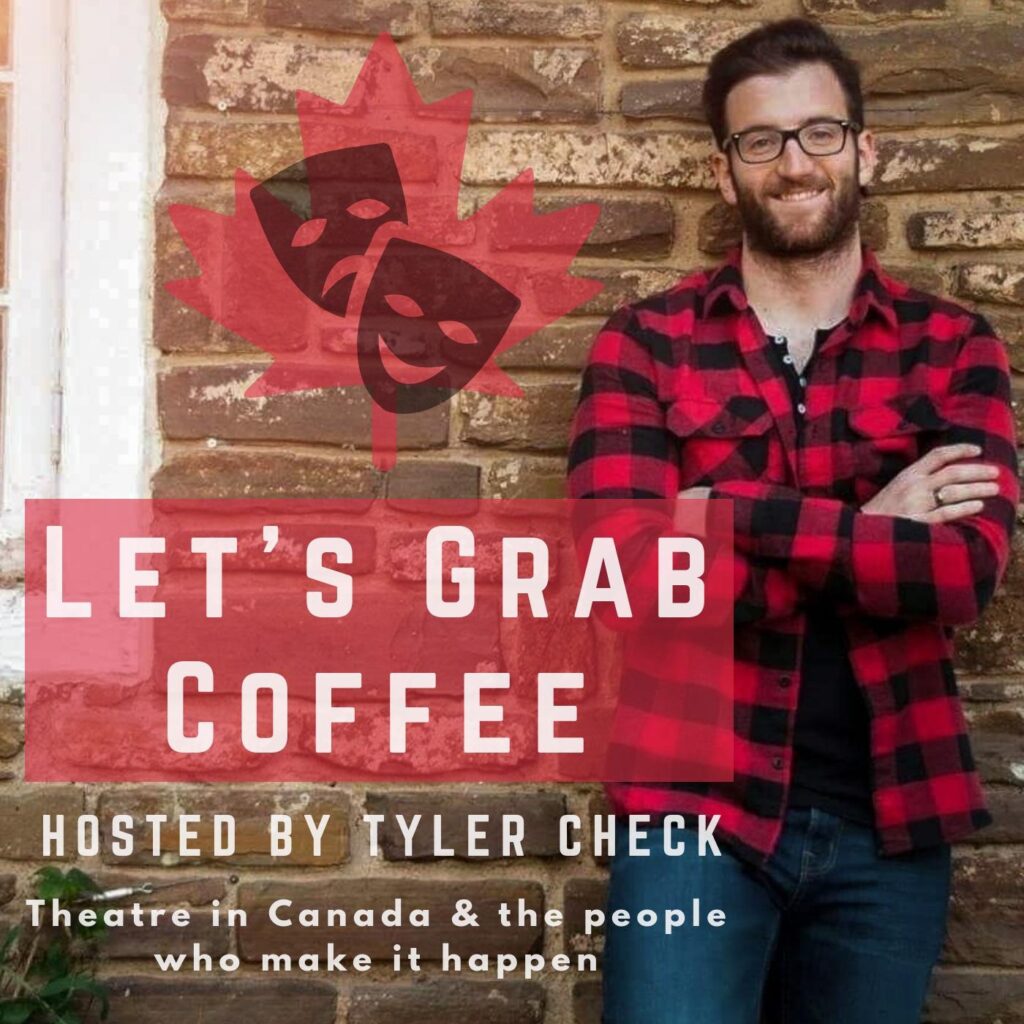
Tyler – Just do it! Make trying new things exciting and make that fear of I don’t know by going down the hill and commit to the act of trying it, and you are not ever going to regret it. You don’t know where you are going to be in ten years and that is great.
As you can probably tell from reading this interview was that the Hunnies (Eunice and Lauren) had a great time speaking with Tyler Check about his journey and especially hearing his insight on what it all means to be an emerging artists and how wonderful it is to think of ourselves as always emerging! Look out for Tyler’s next podcast release as the tables turn this time around because we get to talk about our experiences as we discuss our dreams, how it has been as company owners, performers, burnout, creating art outside of the institutions we learn from and all that good good information about this passion.
Let’s Grab Coffee Podcast is the podcast for anyone interested in theatre in Canada and the people who make it happen. This podcast is hosted by Tyler Check with new episodes every week. Check it out and again look out for our feature this coming week!
